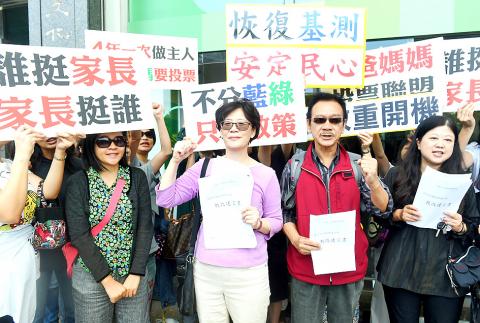Democratic Progressive Party (DPP) presidential candidate Tsai Ing-wen’s (蔡英文) campaign headquarters yesterday promised to cautiously review high-school entrance programs, following a demonstration by a parents’ group, demanding that the Basic Competence Test for Junior-High School Students (BCT) be restored as the qualifying exam for senior high-school admission.
Holding placards reading: “Restore the BCT to make people worry-free” and “Parents support whoever supports parents,” members of the National Parents’ Alliance for 12-year Compulsory Education yesterday rallied outside Tsai’s campaign headquarters in Taipei, saying that if elected, Tsai should restore the BCT, as the current senior high-school entrance programs are too complicated.
“We demand the BCT be restored because it better accommodates the characteristics of different students. For instance, students with special talents might be directly admitted into high school without taking the exam, but for the 12-year compulsory education program, everyone is required to follow the Comprehensive Assessment Program for Junior High-School Students [CAP] exam,” alliance president Chow Mei-li (周美里) said.

Photo: Chang Chia-ming, Taipei Times
Junior high-school graduates might, to some extent, decide whether they would like to attend a senior-high school or a vocational school based on the results of the BCT, Chow said.
They would also have the ability to choose to apply for admission based on their own academic records and extracurricular activities, as well as whether they would like to attend a school near their home, the alliance said.
They might also choose not to take the BCT if they meet the criteria to be admitted to the schools they would like to attend, the alliance said.
On the other hand, the CAP is compulsory for all junior high-school graduates, making the threshold for senior high-school admission higher, as students have to be prepared for not only the exams, but also extracurricular activities.
Alliance vice president Chen Chi-chen (陳綺貞) called on Tsai to increase communication with parents whose children are actually in junior-high school and are seeking senior high-school admission.
“A platform for communication should be established, so that [Tsai] will not only listen to the opinions of some think tanks or ‘tenured parents,’ whose children have already graduated,” she said.
The parents were addressed by the DPP’s Taiwan Academy for Democracy director Yiong Cong-ziin (楊長鎮), who said that the party could not say whether the BCT would be restored if the DPP returns to the power, but promised that the DPP would gather more opinions and make careful considerations before coming up with a policy.

Several Chinese Nationalist Party (KMT) officials including Chairman Eric Chu (朱立倫) are to be summoned for questioning and then transferred to prosecutors for holding an illegal assembly in Taipei last night, the Taipei Police said today. Chu and two others hosted an illegal assembly and are to be requested to explain their actions, the Taipei City Police Department's Zhongzheng (中正) First Precinct said, referring to a protest held after Huang Lu Chin-ju (黃呂錦茹), KMT Taipei's chapter director, and several other KMT staffers were questioned for alleged signature forgery in recall petitions against Democratic Progressive Party (DPP) legislators. Taipei prosecutors had filed

Taiwan would welcome the return of Honduras as a diplomatic ally if its next president decides to make such a move, Minister of Foreign Affairs Lin Chia-lung (林佳龍) said yesterday. “Of course, we would welcome Honduras if they want to restore diplomatic ties with Taiwan after their elections,” Lin said at a meeting of the legislature’s Foreign Affairs and National Defense Committee, when asked to comment on statements made by two of the three Honduran presidential candidates during the presidential campaign in the Central American country. Taiwan is paying close attention to the region as a whole in the wake of a

NEW WORLD: Taiwan is pursuing innovative approaches to international relations through economics, trade and values-based diplomacy, the foreign minister said Taiwan would implement a “three-chain strategy” that promotes democratic values in response to US tariffs, Minister of Foreign Affairs Lin Chia-lung (林佳龍) said. Taiwan would aim to create a “global democratic value chain,” seek to capitalize on its position within the first island chain and promote a “non-red supply chain,” Lin was quoted as saying in the ministry’s written report to the Legislative Yuan submitted ahead of the legislature’s Foreign Affairs and National Defense Committee meeting slated for today. The Ministry would also uphold a spirit of mutual beneficial collaboration, maintaining close communication and consultations with Washington to show that Taiwan-US cooperation

Taiwan and the US have begun trade negotiations over tariffs imposed by US President Donald Trump earlier this month, Minister of Foreign Affairs Lin Chia-lung (林佳龍) said in an interview this morning before reporting to the Legislative Yuan’s Foreign Affairs and National Defense Committee. The Taipei Economic and Cultural Representative Office (TECRO), Taiwan’s de facto embassy in the US, has already established communication channels with the US Department of State and the US Trade Representative (USTR), and is engaging in intensive consultations, he said. Points of negotiation include tariffs, non-tariff trade barriers and issues related to investment, procurement and export controls, he